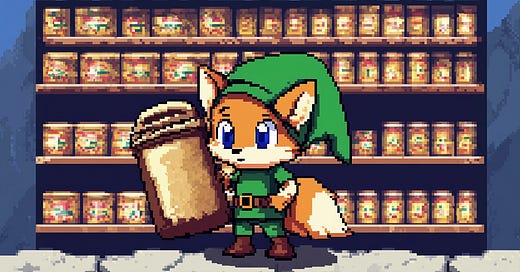Imagine setting out on the most straightforward mission possible: buying bread. Just bread. Nothing else. A task so simple it shouldn't require a strategy guide, except in the wild world of human attention, even the simplest quest can turn into an epic adventure of unexpected discoveries.
I walked into the shop with one crystal clear objective. Buy bread so I could make a sandwich to take to work. A single item, so no shopping list needed. But somehow, I emerged with new shower gel, a tin of Swedish meatballs in sauce, and a limited-edition energy drink in neon packaging. The bread was left on the shelf. Quest failed.
Welcome to the fascinating realm of side quests, where life mimics the most chaotic role-playing games, and your brain is the most unreliable game master.
Real Life: An Unpredictable RPG
In video games, side quests are delightful diversions. In "The Legend of Zelda," you might help a villager find lost chickens or hunt ghosts with a net and a jar. They're optional, low-stakes, and often reward you with unexpected treasures.
Real-life side quests look a bit different:
Reorganizing your entire spice rack while you're supposed to be cleaning the kitchen.
Reading 12 in-depth articles about paprika before deciding if you should use it in a dish.
Writing an entirely new Substack post when you're supposed to be finishing another.
Sound familiar? This very article is a side quest that spawned from trying to finalise the title of another post.
The Neuroscience of Distraction
Here's where it gets scientifically interesting. Your brain isn't powered by importance or deadlines, it's a dopamine seeking missile guided by novelty and curiosity. For those of us with ADHD traits, this tendency is amplified.
Working memory, the mental workspace supposed to hold your "main quest", often has the retention of an already wet sponge. The moment something shiny appears, your brain's quest marker dissolves. "Ooh, let's explore!" becomes the default mode.
I've written about Shiny Object Syndrome before, I think side quests are the same, but different.
The Unexpected Power of Wandering
Not all side quests are villains in your life's narrative. In fact, they can be secret power-ups:
They fuel creativity
They spark unexpected problem solving
They introduce you to ideas you'd never have discovered by staying "on task"
I wrote this entire piece while displaced from something else. And now I feel inspired. productive, like I've unlocked a hidden achievement in my own mental game. So much so, I managed to finish the initial task and that has been published. So I got there in the end.
When Side Quests Become the Boss Battle
There is a dark side to side quests though, they can consume your entire gameplay. You might spend hours sorting your metaphorical inventory while the kingdom burns around you.
Real world examples that might make you wince in recognition:
Spending £50 during a "quick top-up shop" because three-for-£10 frozen party platters looked irresistible.
Watching hours of YouTube productivity system videos instead of actually being productive.
Organizing your desk instead of writing the report due tomorrow.
Tactical Strategies: Reclaiming Your Main Quest
1. Quest Marker Protocol
Before starting anything, explicitly state your mission. Such as "Buy bread", not "go shopping," not "errands," but BUY BREAD. Write it on your hand if you must so you can't miss it. I frequently look like I have shit tattoos on the back of my left hand because I write on it so much.
2. Breadcrumb Navigation
Mid-task and get pulled away? Leave physical clues to get you back on track:
Open a cupboard (where the bread lives)
Leave your car keys on top of your pen and notepad (so you don't forget your list)
Keep a relevant browser tab open (Granted having 94 open tabs might mean this particular tab gets lost in the woods)
Your future self will thank your past self for these navigation markers.
3. Gamify Your Focus
Set a timer for your main task (10 minutes)
Reward: 5 minutes of glorious, guilt-free distraction
You're now the game master of your own attention
4. Side Quest Capture System
Have a dedicated notebook or app to log exciting side ideas. You're not ignoring them, you're saying, "Not now, later."
5. Compassionate Redirection
Sometimes the side quest IS actually the way forward. The key is awareness, not self-judgment. Things change, priorities change, the rules change, as long as you are aware enough to realise that changing the quest is the right thing to do.
The Final Boss: Balance
In life's grand role-playing game, we need both structure and spontaneity. Bread AND Swedish meatballs. Curiosity is not a bug, it's a feature.
Next time you find yourself reorganizing tea bags while supposedly doing something important, pause and ask: "What was my main quest again?"
Sticky notes are your allies. Plaster them where you will see them. Notebooks work well, if you remember to look in them. Phone reminders set to pop up when you think you'll need the reminder are my go to.
Epilogue: A Call to Adventure
Brave adventurer, your quest awaits.
Finish your sandwich. Remember why you walked into the kitchen. Embrace the journey, but don't lose sight of the destination.
Game on. Stay curious.












When curiosity is a watch word, it can't be easy to stay on task. I like reinventing a to do list as side quests. It's funny to me, because I've never been a gamer in that sense. I lose my way down rabbit holes of information and research with disturbing regularity. I used to want to know everything, but now I realize that it's going to take me awhile. Lists are our friends . Thanks for all the tips. Love, V.
P S I'm about a month behind on reading all my emails from Substack. Sorry for the late response. Cheers!
Everything but the bread.... Hilarious and so relatable Mark.